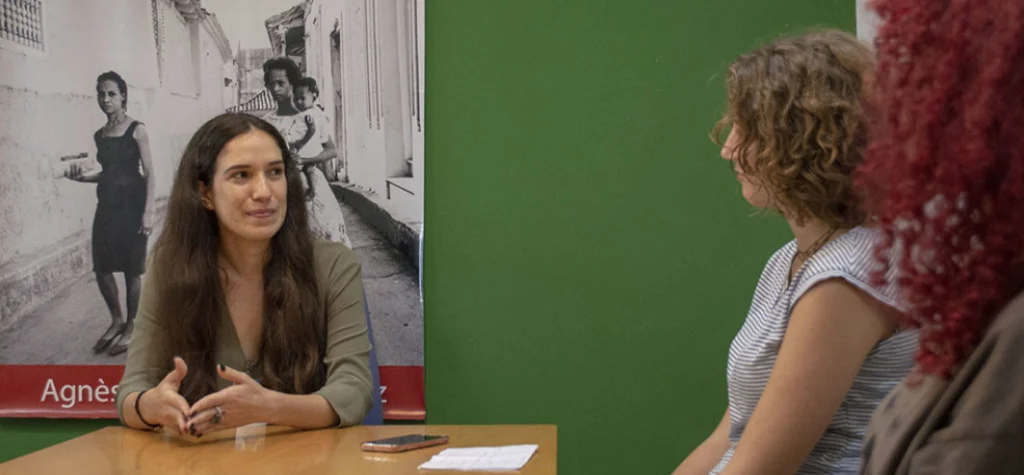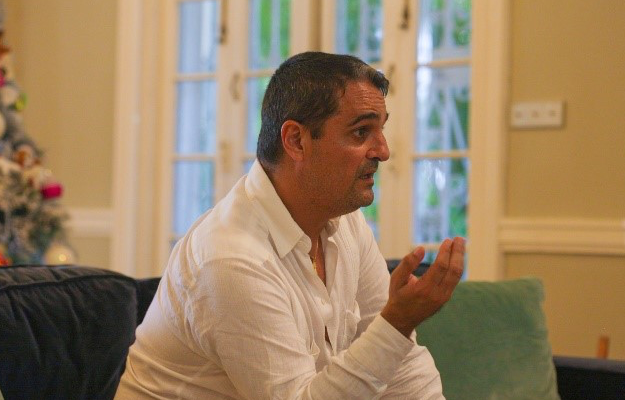By Elízabeth Rodíguez Córdova, Jefa de estudios EP
Playing video games is, undoubtedly, one of the world’s favourite form of entertainment for both children and adults nowadays. Whether this pastime is helpful or harmful is controversial. To game or not to gameseems to be a tricky question at the moment.
Research has shown that, mostly teens, spend too much time playing video games, tending to provoke damaging effects in health, social interaction, moods and lack of motivation to engage in activities other than gaming. For this reason, specialists on the area suggest that parents and teachers should limit the amount of time spent in front of the screen and supervise the contents they can come across with when playing.
Although worldwide reports suggest that video games can have a negative impact, mostly on children’s and teens’ lives when excessively playing them, it is a fact that they can be considered an important experience for people in general. Playing video games can allow individuals to travel around the world and interact with people from different cultures. They can also speed up your response time when facing problems or help you develop critical thinking to judge or change real life situations.
Besides, in terms of education, it is widely known that technology as such has revolutionized the way people learn and have access to information. One of the competences to be acquainted with when finishing the elementary school is precisely that of the technological competence, in which students learn the basis of knowledge, skills and abilities inherent to this area. Furthermore, game-based learning can be enjoyable and helpful for students, when being educational. It should not be a sole method, but a useful tool in terms of learning.
To sum up, whether playing video games is helpful or harmful for people depend on several factors: The amount of time spent in front of the screen, the game type and contents, the learning possibilities and skills they can help you develop among others. So, what should it be for you… game on or game over?
Patrick’s Father
By Patrick Philippe Rettig Osa
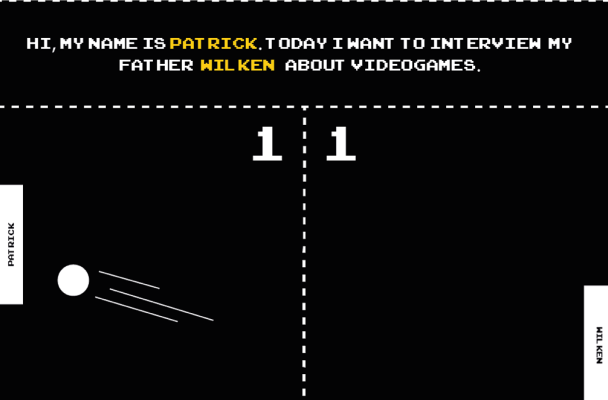
Hi, my name is Patrick. Today I want to interview my father Wilken about videogames.
Q: Do you play videogames?
A: No, but I once borrowed one from a friend, which was quite famous at that time. It was called Pong and was like having a table tennis on a video screen. I remember, it was so boring and monotonous.
Q: Would you approve your son to play videogames?
A: Yes, but only those, which I, as a responsible father would approve.
Q: Why?
A: Because I think, that for example violent videogames can influence young players into performing those violent acts in real life. I also raise concerns, about the fact that videogames may be addictive.
Q: If your son asked you: Daddy, can I have a videogame for Xmas/Birthday? What would you answer?
A: Ask for it and wait for what Santa Claus will bring you or your parents will give you as a birthday present. It is always a surprise!
An ICT teacher’s view on the impacts of playing and designing video games in young scholars these days.
By Victoria Alejandra Sánchez OspinaI, Patrick Philippe Rettig Osa y Robert Apel Yasell
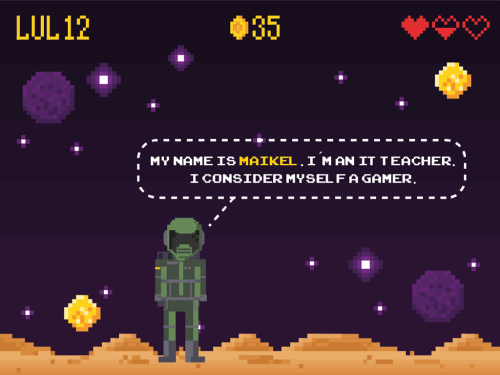
Q: What is your full name?
A: My full name is Maikel Nieves Matamoros.
Q: How old are you?
A: I am 39 years old.
Q: What´s your job?
A: I´m an IT teacher.
Q: Would you describe yourself as a gamer?
A: According to the previous concept, yes, I consider myself a gamer.
Q: Do you know how to design video games?
A: I’m not an expert in all the areas that go into the process of designing video games, but I do know how to turn a game design into a playable one.
Q: What´s your favourite part of the videogame designing process?
A: My favourite part of the process is to create the concept art and to program the characters that are often defined by the relationships and interactions they establish with others and with the player´s psychology.
Q: Are video games good or bad for people?
A: It is not a risk-free pastime, it depends on your age, the time you spend in front of the screen or whether it helps you improve your cognitive abilities or affects your psychology.
Q: What types of skills do you think video games develop?
A: I believe that videogames develop countless skills. Strategizing, hand-eye coordination, logical thinking, creativity and financial planning are among the most significant ones. These skills are definitely important in people´s lives and help them be a proactive and a problem-solving person in society.
Q: What´s your favorite videogame type?
A: I really enjoy playing strategy games: turn-based strategy (TBS) and real-time strategy (RTS).
Q: What´s your favourite videogame?
My favorite one, without a doubt, is the Halo saga.
Q: What do you prefer, playing your own videogames or other people´s videogames? For you, which is better?
A: I really prefer the ones designed by other people, because I don’t consider myself a true expert, despite of the fact that I really enjoy the process.
Q: Can you set an example of a perfect videogame? And a totally awful one?
A: As I mentioned before, I am a huge fan of the Halo saga. Specifically, I would choose Halo Infinite, as a perfect video game for me. I definitely do not like Minecraft. In my point of view, Minecraft is not a very good one. But I clarify, it is an opinion, based on my preferences. Actually, I can assure that Minecraft is one of the most liked games in the world, mainly by children.
Robert’s Mother
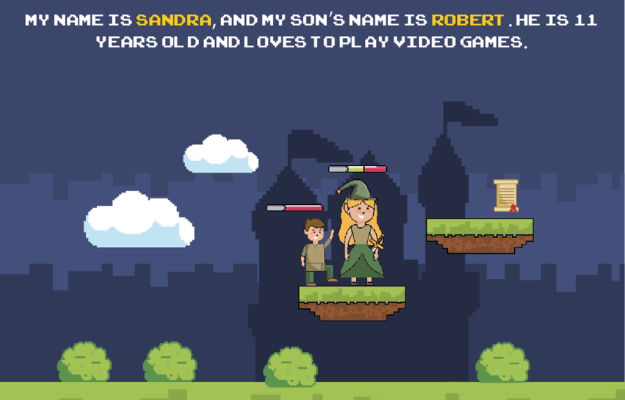
By Sandra Yasell
My name is Sandra, and my son’s name is Robert. He is 11 years old and loves to play video games.
I am in favor of video games under some conditions. If it is true that video games can be addictive when they are not under control, I also consider that video games help a lot in the cognitive development of people.
I must admit that personally, I really enjoy playing videogames, although I don’t have that much time for it, occasionally I like to relax by playing one of my favourite games, like The Legend of Zelda. If I were a child, I would not know the amount of time I would devote to videogames, partly because they were just arising some years ago. In addition, children do not have the necessary maturity to self-define how much time they should spend playing video games. It will always be a decision for parents.
Videojuegos como herramientas en la educación
By Nayadis Rodríguez Remedios, especialista DOP EP
Como especialista del Departamento de Orientación Psicopedagógica reconozco positivo el desarrollo vertiginoso de las tecnologías y a su vez la implicación dentro del proceso docente educativo. En el caso de los videos juegos no hay excepción; considero que son muy provechosos siempre que sepamos, en nuestro papel de mediadores, dirigir el proceso. Y cuando hablo de dirigir y orientar el proceso me refiero a dos cuestiones: primero el tiempo que se destina para este tipo de juegos y segundo el contenido. Recomiendo siempre estar atento para sugerir juegos didácticos, educativos y formativos. Como adultos debemos velar por el no uso de juegos que generan violencia, que considero que son muchos, pero que también hay excelentes propuestas para todas las edades y las preferencias. Y en cuanto al tiempo, pues en dependencia de las edades puede destinarse entre media hora y hasta dos horas, siempre respetando el horario de sueño que es sumamente importante y reconstructivo.
Con los videos juegos los alumnos también pueden aprender, mejorar su rendimiento docente, reforzar sus conocimientos y fomentar el trabajo en equipo. Aquí les dejo algunas propuestas de videos juegos:
Minecraft:
Plataforma de aprendizaje mediante la construcción de proyectos colaborativos. Cuenta con una edición (Minecraft Edición Educación) que permite profundizar en diferentes asignaturas (Lengua, Historia, Matemáticas, Educación Artística) potenciando el pensamiento crítico, la creatividad y el respeto a los demás.
Zoo Tycoon 2:
Profundiza en el mundo animal, las diferentes especies, sus particularidades alimenticias y de desarrollo. Les permite aprender a gestionarse económicamente, así como a diseñar y construir instalaciones, lo que desarrolla su creatividad.
Flippy´s Tesla:
Inventemos el futuro. Ideal para estimular la curiosidad por la ciencia desde una perspectiva muy simple, especial para los chicos que ya se preparan para comenzar una nueva etapa de aprendizaje en la enseñanza secundaria. Los conceptos que se enseñan corresponden, más o menos, a los dos primeros cursos de la ESO.
La torre del conocimiento:
Podemos utilizarlo para reforzar los conocimientos básicos en Lengua, Inglés, Matemáticas, Ciencias Sociales y Naturales de forma divertida.
Sid Meier´s Civilization VI:
Juego de estrategia que permite la creación de una civilización, partiendo de la Edad de Piedra hasta llegar a la actual era de la información. Potencia la concentración, permite pensar y meditar las jugadas.
El misterioso viaje de Layton:
Katrielle y la conspiración de los millonarios permite, a través de una historia detectivesca, el trabajo con rompecabezas y minijuegos donde prima el trabajo en equipo para solucionar los misterios.
Naraba:
Serie de video juego que aborda las materias curriculares del primer ciclo (primer y segundo grados).

